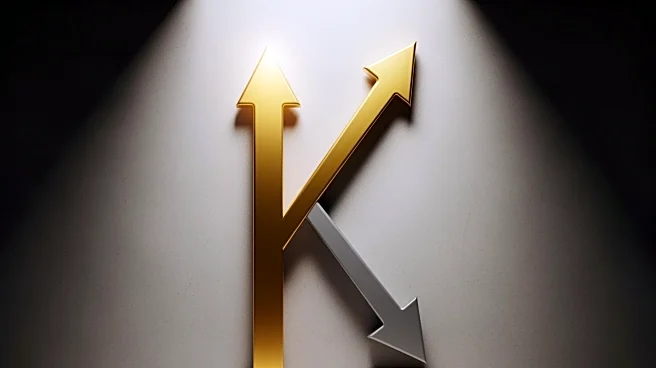What's Happening?
The U.S. economy is currently experiencing a 'K-shaped' recovery, where the financial fortunes of affluent Americans are improving while those of lower-income individuals are declining. This phenomenon
is characterized by a widening gap between the wealthy and the less affluent, as noted by various economic analysts. Chipotle CEO Scott Boatwright highlighted that consumers across all income levels reduced their spending earlier in the year due to declining consumer sentiment, with lower-income guests further reducing their spending frequency. Cresset Capital's Chief Investment Strategist Jack Ablin pointed out that lower-income families spend a higher percentage of their income on essential goods, making them more vulnerable to price increases. Meanwhile, EY-Parthenon Chief Economist Gregory Daco emphasized that the U.S. economy's growth is supported by affluent consumers, AI-driven investments, and asset price appreciation, which could lead to either positive or negative economic cycles.
Why It's Important?
The 'K-shaped' recovery underscores significant income disparities in the U.S., which could have profound implications for economic policy and social stability. As lower-income families struggle with rising costs for essentials, their financial vulnerability increases, potentially leading to reduced consumer spending and economic growth. The reliance on affluent consumers and AI-driven investments as pillars of economic growth may create a fragile economic environment susceptible to shocks. Additionally, the growing inequality could lead to political and social unrest, as history suggests that extreme inequality often results in populist backlash and policy uncertainty, which can disrupt markets.
What's Next?
As inflation is expected to reaccelerate, driven by tariff costs and immigration policies affecting labor supply, the economic divide may widen further. Analysts predict that these factors could lead to decreased economic momentum heading into 2026. The upcoming political landscape may be influenced by affordability concerns, as seen in recent elections, potentially leading to policy changes aimed at addressing economic inequality. Businesses and policymakers may need to adapt to these shifts to mitigate potential negative impacts on the economy.
Beyond the Headlines
The 'K-shaped' recovery raises ethical and cultural questions about the sustainability of current economic policies and the social contract. The increasing inequality may challenge the notion of the American Dream, where upward mobility is attainable for all. Long-term shifts in consumer behavior, such as increased reliance on private label products and reduced dining out, could alter market dynamics and business strategies. Addressing these disparities may require comprehensive policy interventions to ensure equitable growth and social cohesion.










